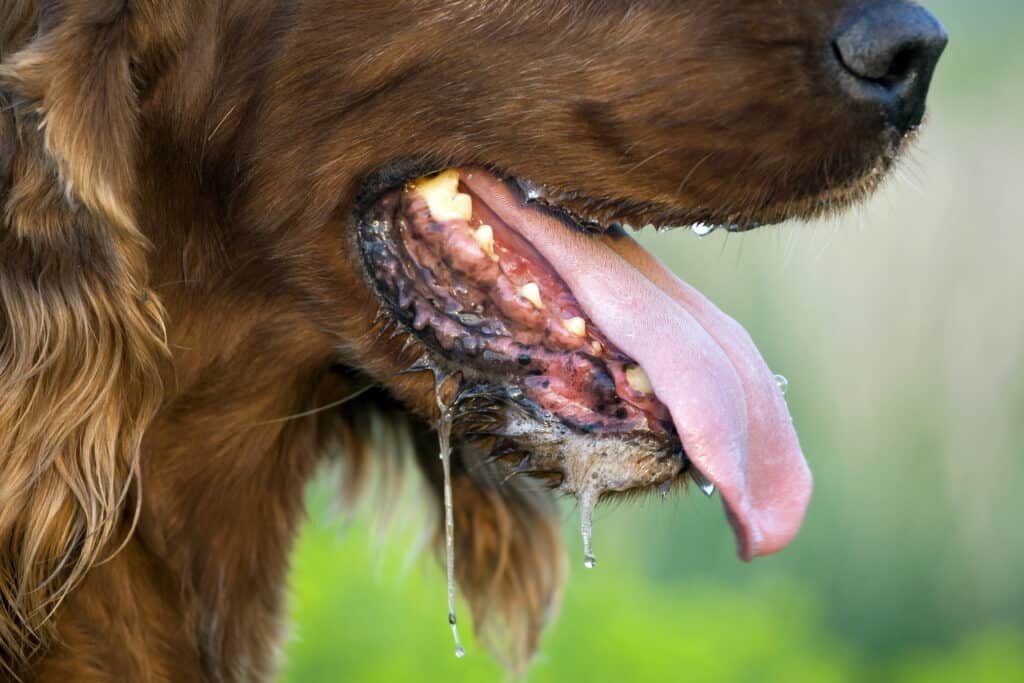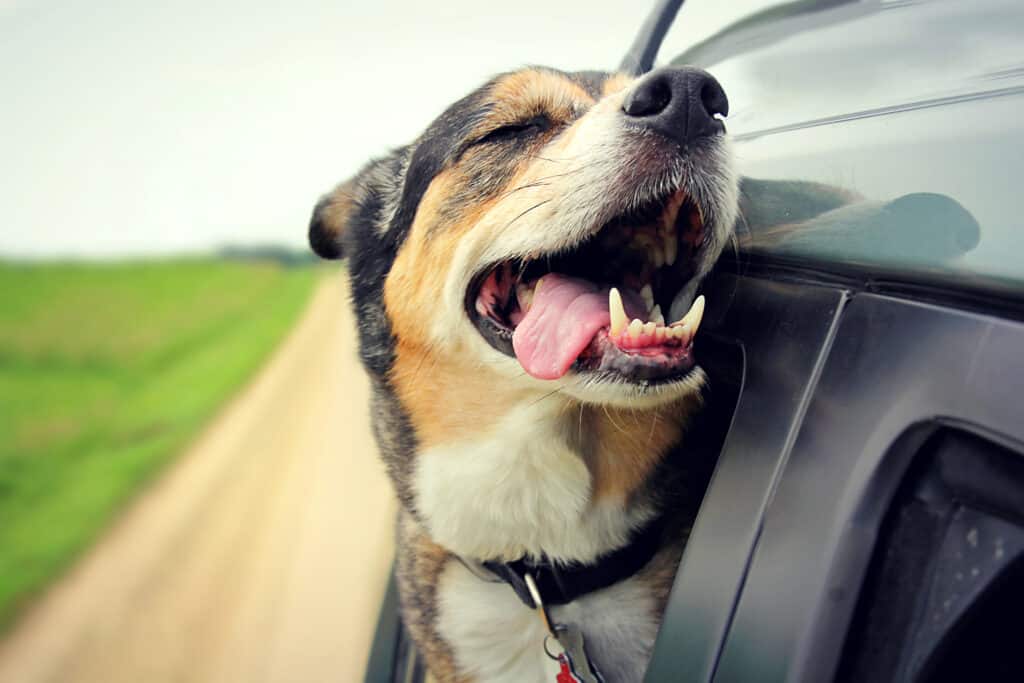Have you ever been cruising down the road with your pup in the car, only to notice that their once chipper demeanor begins to fade? Your previously energetic dog is now lethargic and drooling in the back seat, causing you to wonder what could have possibly happened to cause their sudden shift. If you were leaning towards car sickness, then you are probably right!
We want you to be aware of all there is to know when it comes to motion sickness in dogs, so let’s break down everything from motion sickness symptoms to treatments in our canine friends below!
Do Dogs Get Carsick?
Yes, dogs can experience car sickness just like humans can! Dogs can develop motion sickness whether they are riding in a car or on a boat, leading to a wave of nausea that persists until their vehicle comes to a stop. This motion sickness can range from being mildly nauseating to vomit-inducing, and every furry friend will be impacted differently. Now that you are aware that dogs can indeed get car sickness, let’s break down the rest of the details of this condition below.
What Are The Signs Of Motion Sickness In Dogs?
Motion sickness in dogs is very similar to motion sickness in humans, so their symptoms will be comparable to those we’d experience in a moving vehicle. However, our pups cannot tell us that they are feeling ill during their car ride, so it’s up to us to examine their behavior for clues.
Some of the most common signs of car sickness in dogs to be on the lookout for include:
- Increased whining
- Panting more than usual
- Constantly licking or smacking their lips
- Sudden lethargy
- Increased drooling or drops of drool hanging from their mouths
- Trembling
- Gurgling of their stomach
- Vomiting
- Diarrhea
If you notice any of the above symptoms in your dog during your car ride, they may be experiencing the symptoms of motion sickness!

A dog that’s drooling and panting in a car may be carsick.
©Reddogs/Shutterstock.com
How Long Does Motion Sickness Last In Dogs?
In most dogs with motion sickness, their nausea will not resolve until they have either calmed down enough to fall asleep during the car ride, or once the vehicle comes to a stop. Some dogs will even experience nausea for up to an hour after the car ride ends, as it can take time for some dogs to stabilize. Their symptoms will often be more intense and last for longer periods if they are highly anxious in the car, as anxiety around car travel will only exacerbate their symptoms.
If your pup is experiencing car sickness and you think they are about to vomit, the best thing to do is to pull over the car and take them out for a quick walk. This will either allow them to vomit outside of the car, or it can help to soothe their stomach enough to make it the rest of the way without issue. Sometimes a walk on solid ground and a bit of fresh air can make a huge difference for a carsick pup.
Can Dogs Grow Out Of Motion Sickness?
Thankfully for the canine companions in our family, many dogs will grow out of motion sickness by the time they reach 1-2 years of age. This is believed to be due to the fact that parts of a dog’s inner ear might not be fully developed until the dog reaches 1 year of age, so some dogs will outgrow their car nausea once this aspect of their body matures.
It’s also important to be aware of how big of a role anxiety and stress play in a dog’s motion sickness. Lack of conditioning around car travel can lead to significant anxiety in dogs once they enter a car, and this will only heighten their motion sickness symptoms. By getting your dog more comfortable with car travel so it is not such a scary ordeal, you might be able to decrease their motion sickness symptoms.
Can I Prevent Carsickness In My Dog?
Just as we mentioned above, desensitizing your dog to car travel is one of the most effective ways to prevent car sickness in the future. The best way to do this is by taking multiple short car rides around your neighborhood or to nearby locations, as this will help your dog adapt to the feeling of being in motion in a vehicle. This will also show them that not all car rides end in a trip to the vet or other anxiety-inducing locations, especially if you make sure that some of these car rides end up in a location that they love.
Desensitizing your dog to car travel can take time, but it can make a world of difference for your carsick canine friend in the future. This will also make trips to the vet or to the groomer much easier for everyone, as you won’t have to worry about an anxious pup that you have to get in and out of the car.
Another way to help prevent motion sickness in dogs is by withholding food for 6-8 hours before their car ride. Eating too soon before a car ride can lead to stomach rumbling, which will only increase the symptoms of motion sickness for many furry friends. We also suggest refraining from giving your dog any treats while they are in the car, as this might cause their stomach to churn and lead to an increase in their nausea. We know how tempting it is to reward your pup at this moment with their favorite snack, but positive praise and some head pats are enough for a carsick dog.
We also suggest keeping the car nice and cool, as warm temperatures will only increase stress and exacerbate their nausea. You can even roll down the windows and let in a bit of fresh air, as this seems to make a difference for many nauseous pups in moving vehicles.
And last, you can also make sure your dog has their favorite toy or bone in the car if they are known to get car sick. Sometimes the distraction of chewing on their favorite toy or treat is enough to keep their nausea at bay, and it will also help to ease their nerves around the car travel experience.

One easy way to reduce the likelihood of a carsick dog is to roll down the window.
©Christin Lola/Shutterstock.com
Can I Give My Dog Medication For Motion Sickness?
If your dog is one of the unlucky pups that struggles with motion sickness no matter how calm they are, there are medications that can bring them relief. There are two main over the counter medications that contain either dimenhydrinate or meclizine, and these seem to be effective for dogs when given 1 hour before their car travel. Though these medications can be found in most drug stores, we suggest giving your vet a call for an accurate does for your dog’s weight range.
If your dog has severe anxiety around car travel that has not been managed with desensitization, it might be a good idea to speak with your vet about anti-anxiety medications. The medications we mentioned above will help to prevent nausea, but they cannot do anything for your dog’s anxiety. These medications will need to be prescribed by your veterinarian, so you will need to reach out to your veterinary team if you think this is necessary for your dog.
Final Thoughts
Motion sickness is an uncomfortable condition that plagues many canine friends during car travel. These symptoms are often a result of simply being present in a moving vehicle, but anxiety around car travel also plays a major role. We suggest trying your best to desensitize your pup to the idea of riding in a car, as this alone will decrease their risk of motion sickness in the future. If this is not enough for your canine friend, you can also give your vet a call and ask for dosing instructions for over-the-counter motion sickness control.
Up Next:
- The Best Dog Car Seats: Reviewed For 2022
- 5 Best Treatments For Car Sick Dogs
- The Best Dog Ramp For Cars in 2022 (Light, Affordable, Freestanding)
The photo featured at the top of this post is © Kseniia Kolesnikova/Shutterstock.com
Thank you for reading! Have some feedback for us? Contact the AZ Animals editorial team.






